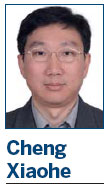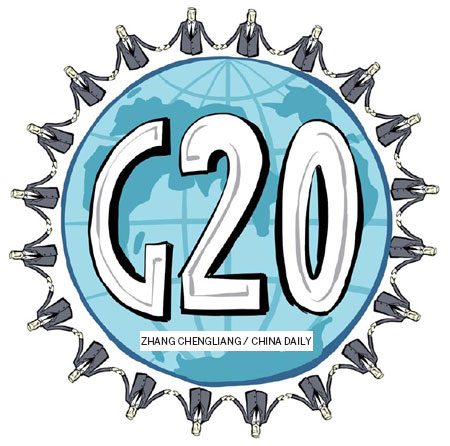President is a man of the world
Updated: 2013-09-13 10:11
By Cheng Xiaohe (China Daily)
|
|||||||||||
Xi Jinping's third successful overseas trip has bolstered China's foreign affairs credentials
President Xi Jinping's third diplomatic trip abroad since assuming power in March has shored up his growing reputation as a statesman on the world stage, putting paid to speculation he would favor a stay-at-home leadership style.
Xi, who has surprised China watchers who believed he would focus exclusively on domestic challenges in the first few months of his tenure, embarked on a tour of several Central Asian countries after attending the G20 Summit in Russia this month.
His third trip overseas in less than seven months at the helm, Xi's decision to engage in a hectic schedule of diplomacy on the world stage has sent a strong message to pundits.
As a leader, he has signaled he is prepared to give foreign affairs and domestic issues equal weight and importance.
Xi's diplomatic track record thus far speaks volumes about his priorities and leadership style.
Upon assuming the presidency in March, he took his first overseas trip. He moved quickly to consolidate China's strategic partnership with Russia and renewed the traditional bonds of friendship with key African countries. He also threw his weight behind BRICS, which represents the five major emerging market economies.
In an effort to demonstrate China's balanced diplomatic approach, Xi turned his attention to the other side of the world for his second overseas trip. Trinidad, Tobago, Costa Rica, Mexico and the United States were all on the itinerary.
Xi's choices clearly indicate his willingness to give big and small countries equal treatment, while giving more attention to Latin America.
While the G20 summit is typically an important forum for the most influential countries in the world to discuss and manage economic issues, the agenda at this year's summit was overshadowed by political and security concerns.
In the spotlight and under the gaze of a curious international community, Xi used his speech to assure the world China still enjoys the right conditions and has the ability to continue to achieve sustainable and sound economic development. He also called for a more open world economy and expressed his firm opposition to all forms of trade protectionism.
In a meeting with his US counterpart, Barack Obama, Xi reiterated China's firm stance against the use of chemical weapons, but stressed China is opposed to military intervention in Syria.
Despite that disagreement, the leaders avoided getting bogged down in the controversy surrounding the Syria crisis, instead finding common ground in other issues including the nuclear issue on the Korean Peninsula. As Xi was quick to point out, China and the US have more areas of agreement than points of difference in the Asia-Pacific region. It is worth noting that when Xi and Obama walked out of the conference room their body language suggested both had enjoyed a constructive and fruitful conversation. It is now reasonable to believe that the relationship between China and the US has grown strong enough to weather almost any challenge.
Indeed, relations seem to have emerged unscathed from the recent friction created by the Edward Snowden case.
The G20 summit, whose primary task is to tackle global economic and trade issues, was this year consumed by the evolving political drama between the US and Russia. Pitted against each other, both nations tried to rally support from allies and bring other member nations into their camp. Against this contentious and tumultuous backdrop, Xi further honed his diplomatic skills. He adroitly struck a delicate balance between granting support to Russian president Vladimir Putin, who strongly opposes any US military strike against Syria, while managing to avoid alienating Obama, with whom Xi has begun to cultivate a new level of relations.
Another highlight of Xi's performance at the G20 summit came when he ran into Japanese Prime Minister Shinzo Abe in the VIP room, an encounter that caught the world off guard. During the brief and impromptu meeting, Xi conveyed three key points. "We are unwilling to see grave difficulties develop for Sino-Japanese ties," that "the Chinese side is willing to further advance the China-Japan strategic ties of mutual benefit on the basis of four Chinese-Japanese political documents" and that Japan "should seek a way to properly manage differences and address the problem". From a Chinese perspective, the unexpected meeting conveys two things very clearly. China wants to put Sino-Japanese relations back on track, but Japan should do more to make this happen. Even though it is too early to predict how the informal encounter may affect Sino-Japanese relations, the meeting itself is a move in the right direction for both nations.
Given Central Asia's proximity to China and its huge oil and natural gas reserves, it occupies a prime position in China's efforts to use diplomacy to secure future energy needs. In the past decade, China has painstakingly built massive networks of oil and natural gas to transport resources from West to East China. In order to secure a long-term, steady and safe energy supply, China has simultaneously made significant inroads into Central Asia's energy market.
Working with local partners, Chinese companies have invested heavily in the region. The partnership arrangements have helped Kazakhstan, Turkmenistan, Kyrgyzstan, and Uzbekistan explore new oil and gas fields, set up petroleum refineries, and build a number of oil and natural gas pipelines that stretch thousands of kilometers. With some of those pipelines connected to China's energy networks in the west of the country, Central Asia has become one of the country's major sources of oil and natural gas.
China's continued economic growth has been accompanied by an upsurge in demand for energy. Xi's visit to Central Asia reveals the new Chinese government places energy cooperation with the Central Asian countries right near the top of its diplomatic agenda. During Xi's visit to Central Asia, he pushed for accelerating construction of Line C of the China-Central Asia gas pipeline project and for bringing forward plans to construct Line D.

In a sign of how dramatically Turkestan's standing has risen through China's focus on energy diplomacy, the two countries signed a strategic partnership treaty. This now makes four out of five states in Central Asia that have entered into strategic partnership arrangements with China.
For China, energy is important, but it is not the only priority.
China becoming a leading trading partner to the Central Asian nations means other economic benefits will flow.
During Xi's visit to Central Asia, he secured agreements to boost two-way trade with partner nations to specific targets by 2015. And in order to further deepen Sino-Central Asia economic cooperation, Xi proposed a new silk route that will integrate China and Central Asia's economies by sharing infrastructure, a level of connectivity that will link China's rail and road networks to Uzbekistan and Kyrgyzstan.
In addition to talks on energy and economic partnership, Xi pressed hard to promote security cooperation with Central Asian countries in an effort to root out separatism, extremism and terrorism.
To facilitate movement in areas of economic partnership and security, Xi unveiled an ambitious plan at Nazarbayev University under which the Chinese government will offer as many as 30,000 scholarships to students from member states of the Shanghai Cooperation Organization. Under the bold initiative 10,000 students from Confucius Institutes in these countries will be invited to do advanced studies and research in China over the next 10 years.
China's growing presence in Central Asia has predictably aroused some nervousness in the region. In an effort to assuage concerns, Xi said that China has no intention of seeking a dominant role in the region and would not push to create a sphere of influence in Central Asia.
The author is an associate professor at the School of International Studies and deputy director of the Center for China's International Strategic Studies, Renmin University of China. The views do not necessarily reflect those of China Daily.

(China Daily European Weekly 09/13/2013 page13)
Today's Top News
List of approved GM food clarified
ID checks for express deliveries in Guangdong
Govt to expand elderly care
University asks freshmen to sign suicide disclaimer
Tibet gears up for new climbing season
Media asked to promote Sino-Indian ties
Shots fired at Washington Navy Yard
Minimum growth rate set at 7%
Hot Topics
Lunar probe , China growth forecasts, Emission rules get tougher, China seen through 'colored lens', International board,
Editor's Picks

|

|

|

|

|

|





